The Art and Science of Kettlebell Training
Learn how to properly use this humble lump of iron and achieve a new level

The Art and Science of Kettlebell Training
Learn how to properly use this humble lump of iron and achieve a new level
Are Carbs Bad? Do You Have Carbophobia? The Pro’s and Con’s of Low Carb Dieting
Is cutting carbs the key to losing weight? A detailed look at why is the
Recover Faster, Grow Stronger: 10 Proven Recovery Techniques
Many people still believe “time off” is the best way for us to recover from
9 Basic Rules Of Eating For Muscle Growth
Eating a balanced diet can be very complicated with a busy modern life. I often

Sitting! It’s bad for your health! Here is what we know
Do you suffer from: Back Pain, Neck Pain, Foggy Brain, Tight hips, Mushy abs or Sore
Intrigued by Fasting? Here’s the Latest Science on Four of the Primary Health Benefits
Guest Author: Alex Goik Here to share some words | Founder of Foreign Affairs Navigator |
8 Week Intermittent Fasting Transformation: How I Got Ripped In 8 Weeks
My 8-Week Intermittent Fasting Body Recomposition Hey guys! My name is Simon and I run
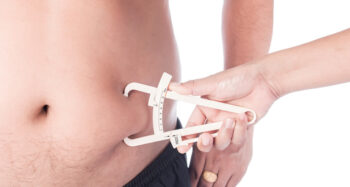
Body Fat Percentage Photos For Men And Women
BODY COMPOSITION EXAMPLES Are you wondering what your body fat percentage is? We have put
Use The “Think and Grow Rich” Method To Set An Amazing Physique Goal (FREE WORKSHEET)
Our modern day lives are so busy with the constant bombardment of notifications, emails, deadlines,

Coronavirus is here, and its time to boost your immune system. Here is what you need to know to remain as healthy as possible and reduce your risks
Disclosure
Immunity tends to refer to the capacity of the body to ward off infections, and tends to be measured acutely by seeing the count or activity of immune cells that can help ward off sickness. Enhanced immunity results in less sickness.
Your immune system is your front line defence against pathogens, viruses and disease. When your body is trying to heal and fight off sickness, your immune system is working on overdrive to send troops to the front line and FIGHT! Some of us are losing this battle, so I wanted to contribute by offering my 2 cents and hopefully you find value from this post.
We are seeing many people dying from coronavirus primarily due to lung related issues. The elderly are more so at risk but this is because they have a weakened immune system. Immune function declines with age which leaves elderly more susceptible to more severe illness and COVID-19.
As we age, the systems our bodies use to fight disease wear down. Not only does the body have a harder time fighting off new infections like COVID-19; it is also more likely to be afflicted by chronic diseases which weaken the immune system.

As you can see, most of the victims are elderly. Read more on why coronavirus is more dangerous for the elderly. Additionally, existing conditions such as Cardiovascular disease, Diabetes, Chronic respiratory disease and cancer appear to increase your odds of falling victim to Coronavirus. Pollution also has also been found to negatively effect your immune system and health

This shows that people with existing health conditions are at higher risk of dying from the virus. Those who have compromised immune systems are more at risk to the harmful effects of an invading virus. These chronic conditions put a huge toll on the body’s ability to defend itself and therefore it is not as effective at fighting off COVID-19 invading their cells and lungs.
This is not to say that others with no previous medical conditions or lowered immune system will not contract or suffer from COVID-19, however, the rate for that demographic is low. Many of us will catch the virus eventually, and when that happens we will want our immune systems to be as strong as possible to reduce symptoms and prevent hospitalisation or fatalities.
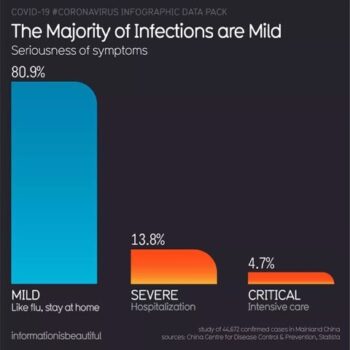
Fortunately, most of the cases are mild, and only a small percentage of the population gets to a severe state (hospitalization) and even fewer are critical (intensive care). These are the immune compromised patients and elderly but there have been recorded deaths of healthy young adults. The cause to be concerned is not as high if you are young and healthy.
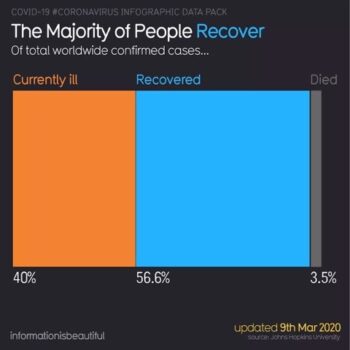
As only 3.5% of people die from getting infected by COVID-19, the majority of people will recover back to full health.
So, back on topic… we can see clear links between our immune system and coronavirus. So what can we do to help protect us from coronavirus?
Lets Get Healthy As F*ck
Cardiovascular disease, diabetes and chronic respiratory disease and high blood pressure are conditions that are largely affected by your nutrition and lifestyle choices. Nutrition is now believed to contribute to approximately 678,000 deaths each year in the United States. Globally, 1 in 5 deaths are associated with poor diet and believed to cause more deaths globally than smoking!
As mentioned on the recent Joe Rogan podcast episode, obesity is another contributing factor that effects your immune system. There are well established links between obesity and reduced lifespan, but few know about the reduced immune system so I thought it was worth mentioning.
Obesity rates are around 6% in China, where as countries such as Australia, America, Canada, Mexico all sit around 30% obesity rates. This may put more people at risk.

Nutrition
Nutrition, as mentioned previously, is a critical part of preventing disease, keeping your immune system healthy and staying at the appropriate body composition. Many people (especially in western culture) consume too many calorie dense foods which are low in nutrients. A high quality diet is generally lower in calories and higher in protein and nutrients! Your immune system needs a lot of nutrients to function optimally.
Physical Activity
Regular exercise is one of the best things you can do to stay healthy and boost your immune system. 20 minutes a day, moderate intensity should be fine. Be sure to check the guidelines of your country but most would recommend around 120 minutes per week.
Stop Drinking
Alcohol is a poison, a fun poison. A little bit can bring us a bit of joy and reduce social anxiety, but too much alcohol can have detrimental effects on your health and immune system. Excessive alcohol consumption reduces the number and function of three important kinds of cells in your immune system–macrophages, T and C cells. Ever notice you get sick after a big night out?
Stop Smoking
Smoking is terrible for your health, especially your lung health. It puts immense stress on your body and especially your lung health. Smoking interrupts immune functionality and causes various diseases, what better time to quit?
Sleep 8 hours A Night
Sleep has a powerful effect on the immune system, which is why, when we have flu, our first instinct is to go to bed: our body is trying to sleep itself well. Reduce sleep even for a single night, and your resilience is drastically reduced. If you are tired, you are more likely to catch a cold. The well-rested also respond better to the flu vaccine. Getting too little sleep across the adult lifespan will significantly raise your risk of developing Alzheimer’s disease. For more information about sleep, follow Mathew Walker.
Getting 8 hours of sleep is great, but there are many other ways you can optimise your sleep
Lose Weight If You Are Obese Or Overweight
As mentioned previously, obesity plays a roll in your immune system. You may want to consider following a dietary protocol to lose weight. Remember, calories in vs calories out is the most important factor when it comes to losing weight. If you need help with your nutrition, check out the personalised eating plans. Here is a post on body composition and body fat percentage photos for men and women so you have a good idea of where you are currently at.
Proper Hydration
This is super basic but often overlooked. Just imagine your body is like a car, but instead of fuel it requires water. The running rate is around 300ml per hour or 2-3L per day.
Stress Management
When we’re stressed, the immune system’s ability to fight off viruses and pathogens is reduced. Stress creates a “fight or flight” response on the body and raises cortisol levels which can suppress the effectiveness of the immune system. Obviously there is a lot of panic, fear and stress during this event. I would implore people to try and remain calm and deal with their corona-stress in healthy ways. Mediations aps such as insighttimer are free and useful for improving your mindfulness and reducing stress levels.
Okay, I think I’ve covered all bases about what you should know. These fundamentals of general health and immune system are better than relying on “quick fixes” such as your local organic kombucha, immune system pills or immune boosting foods.
There are very few shortcuts when it comes to being healthy
There is still plenty of evidence to suggest the following foods have positive effects, but they should be the “icing on the cake” for a healthy lifestyle, exercise routine, good sleep and quality nutrition.

8 Immune Boosting Foods / Supplements:
Disclaimer: the majority of evidence we have is from the common cold or flu. The way that coronavirus functions in the body may be similar although the supplements proven effective for one condition may be less or more effective for another condition.
Garlic – Garlic can improve the ability of white blood cells to destroy invaders, in a process called phagocytosis. It also increases the production of t-cells, another one of the body’s defences. Due to these two properties, garlic can reduce the risk of infections and the common cold by as much as 60%.
How much? Three cloves of garlic, eaten with meals throughout the day, will provide maximum benefits.
Vitamin C – Vitamin C can reduce the duration of illness and the frequency of the common cold if supplemented by very physically active people. When taken as a daily preventative, vitamin C can ward off the common cold. Taking high doses of vitamin C at the beginning of an illness
will not reduce the severity of symptoms. Active people are the most likely to benefit from vitamin C’s ability to reduce illness frequency. If you do not regularly exercise, vitamin C supplementation will not prevent you from getting sick. One website has suggested Vitamin-C will not be very effective against COVID-19, but may provide a mild immune boosting benefit.
How much? Take 1,000 – 2,000 mg, in divided doses throughout the day
Pelargonium sidoides – commonly known as African geranium, is a medicinal herb. It is also sold under the brand names Kaloban and Umckaloabo as a plant-derived pharmaceutical. Pelargonium sidoides is very effective for treating acute bronchitis. It increases the body’s natural healing rate. Studies have found that 40-60% of patients suffering from acute bronchitis fully resolve their symptoms within a week of Pelargonium sidoides supplementation.
Preliminary evidence suggests Pelargonium sidoides can reduce the duration of the common cold, while treating symptoms. It may also provide benefits for people suffering from lung disorders, by alleviating flare-ups in symptoms.
How much? Doses vary per age – 10-30mg but ide recommend following guidelines of the supplement you buy
Spirulina – Spirulina is a protein-rich algae that contains several bioactive compounds with anti-inflammatory effects. Though Further research is needed to determine whether spirulina can ward off sickness, it has been shown to be effective at reducing symptoms of nasal allergies. Low doses of daily spirulina has been shown to alleviate the stuffy nose and sneezing that comes with allergies
How much? Take 2g daily for at least twelve weeks
Zinc – Zinc is an important dietary mineral that can bolster the immune system and protect against the common cold and other infective diseases. Zinc supplementation, if taken at the first sign of symptoms, has been noted to reduce the length of sickness and may prevent symptoms from getting worse.
How much? Only when sick, consume 75mg Zinc split into several doses throughout the day. Supplementation should be stopped as soon as symptoms disappear. Due to potential toxicity levels, ide recommend doing the appropriate research on this one!
Vitamin D – This is an important nutrient for the human body to function optimally. Vitamin D is a steroid hormone that controls the activity of close to 5% of the protein-encoding human genome. Many vitamin D-regulated genes are involved in immune function. A meta-analysis of 25 randomized controlled trials found conducted in 14 countries, found that vitamin D supplementation cut the risk of infection with respiratory illnesses by 50% in people that were vitamin D deficient and by 10% in people with normal vitamin D levels.
Those with insufficient Vitamin D levels are significantly more likely to develop heart disease than those who do not. Some, but not all, intervention studies have also found that vitamin D supplementation at moderate to high doses may reduce the risk of cardiovascular disease. It is also important to note that if you are spending more time indoors, your natural vitamin-D intake will be reduced.
How much? 1000-2000 iu daily. You may have low levels in which case you may want to dose a higher dose (4000-5000 iu) for 1-2 months then reduce to 1000-2000 iu.
Echinacea – Though echinacea supplementation can be effective, much more research is needed before it can be specifically recommended for allergy and immunity-related supplementation. Though it is widely used, it does not have a lot of consistent evidence for its effects. Echinacea may interact with many drugs. Do not supplement echinacea if you are taking immunosuppressive medications as it has been found to interact with certain medications. Be sure do your own research.
How much? 300-500mg three times a day
Astragalus Membranaceus – Astragalus membranaceus is an important herb in traditional Chinese medicine. It appears to activate immune cells to a degree higher than the reference drug echinacea. Astragalus membranaceus has been researched for its cardioprotective, anti-inflammatory, and longevity effects.
How much? It works synergistically (hand in hand more powerful then when taken together) with Angelicae sinensis on the 5:1 ratio. 30mg of Astragalus and 6mg of Angelicae. Standard doses of Astragalus Membranaceus may be recommended at 5-10mg. Follow directions of supplement company or physician
Side Note: Lifestyle changes due to COVID-19
During this crisis, many people will be isolated for some time period. This means they will have less physical activity, steps per day, social contact and their diets will not be the same as usual.
All of these factors can contribute to the already high levels of stress from the situation.
To offset this, it would be smart to:
The Big Picture
Boosting your immune system and staying healthy shouldn’t just be a short term goal. There are many other killer diseases out there and coronavirus isn’t even the top 10 (yet).


Boosting your immune system is not just useful for the present time… It should be a long term goal to prevent the loss of your health, time or life.
Your immune system is your front line defence, lets upgrade its weaponry!
I hope you found value in this post and be sure to comment below if you feel like I missed something. Please share this post with your friends, family and loved ones. Stay healthy, stay strong!
– Simon de Jager
BcS Nutritionist & Specialised Personal Trainer
Owner of Found My Physique
Be sure to follow on social media:
Useful Links:
John Hopkins CoronaVirus Mapping Tool
Quality data and information on Coronavirus
Good analysis of the situation and why we need to act now!

Let me be honest, I struggle with brain fog. It’s a lot less than it used to be but I have learn tricks and tactics to help get myself “in the zone” so i can maintain focus and concentration for longer time periods.
When I first heard of binaural beats, I thought it was some hippy crystal energy bullshit, but the more reading and experimenting I did, the more I realised there is a practical benefit to using them regularly.
Binaural beat therapy is an emerging form of sound wave therapy. It makes use of the fact that the right and left ear each receive a slightly different frequency tone, yet the brain perceives these as a single tone.
Binaural beats are simply just 2 different sound waves (one in each ear) playing at different frequencies. There is a slight difference between the left and right frequency, and the difference is measured in Hz. There are 5 ‘zones’ of frequencies that have been shown to provide slightly different benefits; delta, theta, alpha, beta and gamma (more details below)
Have you ever noticed it can take you 5-10 minutes to really feel like you are “in the zone” when you start reading?
You may have also noticed that it takes some time to quiet the chatter of your brain when you lay down to nap or rest?
There is a GAP there between one state and the next state.
Much of how our brain is operating is dependent on what “State” our brain wave frequencies are in, but this GAP you are noticing between one activity and another is the transition into a new (more synchronised) state.
Side note: There are obviously so many mechanisms that are impacting the way your brain is operating – neurotransmitter balance, stress levels, our thought patterns, biological stresses, sleep deprivation etc… But for the sake of this example, let’s roll with it…
Below is a visual example of how your brainwaves become more in “sync” and you can feel these flow states.
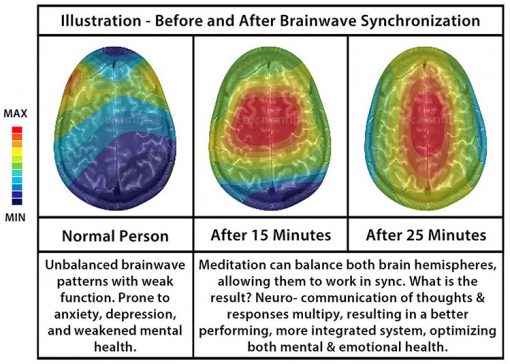
I know what your thinking, sounds too good to be true right? I was very sceptical at first, however, the literature suggests that these things work and according to a recent 2015 review of the evidence, they have a range of benefits. I have been using Binaural beats for 5 years now and I am convinced they are super effective (for a few specific purposes). Read below on how they work, how to use them and what frequencies to listen to. Dont take my word for it though, It is best to form your own opinion…
“Absorb what is useful, discard what is not, add what is uniquely your own” – Bruce Lee
According to the 2015 literature review, the tones should be at frequencies lower than 1,000 hertz (Hz) for the brain to detect the binaural beat. The binaural beat that a person perceives is the frequency difference between the waves entering the left and right ear. For example, if the left ear registers a tone at 200 Hz and the right ear registers one at 210 Hz, the binaural beat is 10 Hz — the difference between the two frequencies. The review found benefits for memory, attention, stress levels and clarity. Further research is ALWAYS required, but as far as science can tell, Binaural beats actually work!
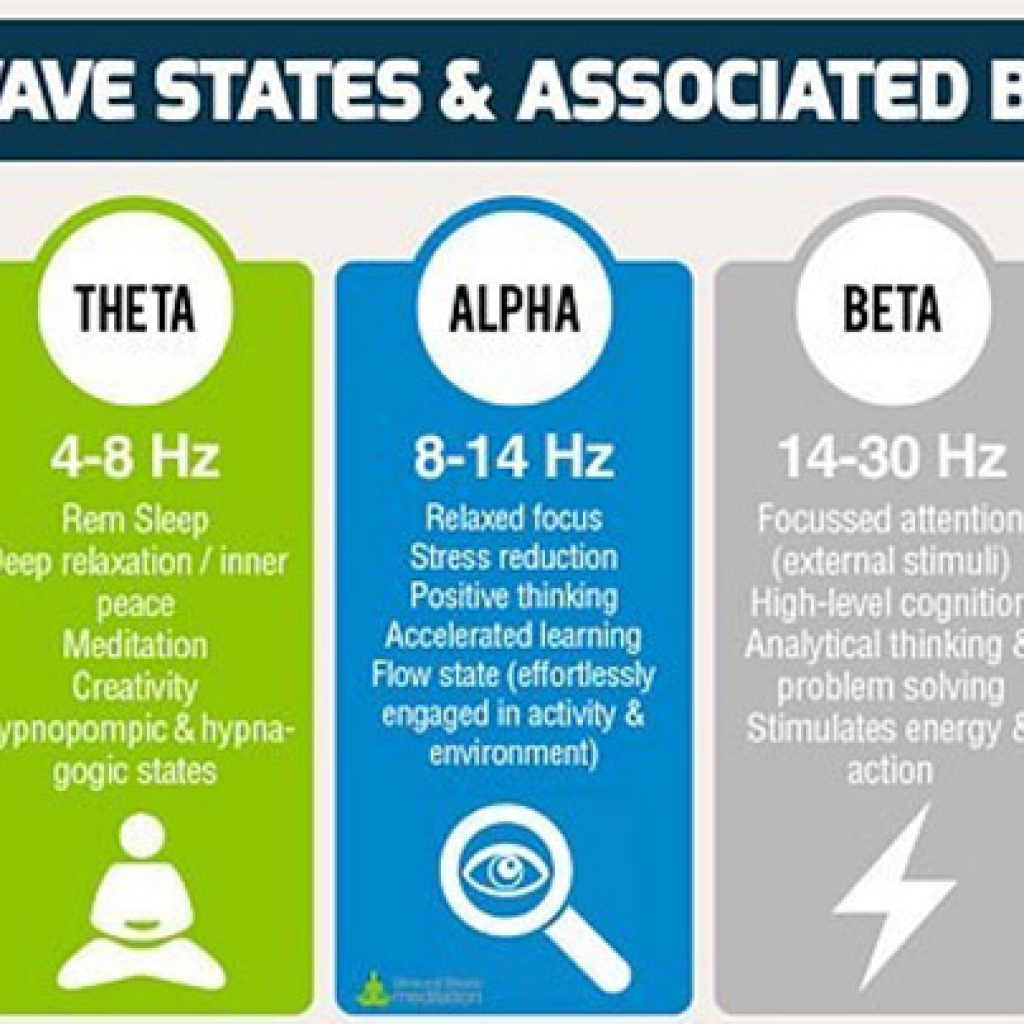
Binaural beats will not magically give you amazing control over your mind, but they are a useful tool. Ide recommend a regular meditation practice if you struggle to get into many of these states naturally. Get good at controlling your mind or your mind will control you! I digress, here is a list of some benefits of binaural beats:
Other people use them for deep sleep, but I personally have trouble “falling back to sleep” (during sleep insomnia) more so than the process of falling asleep (pre-sleep insomnia) so the idea of having uncomfortable headphone to remove or roll onto is a little off-putting. Saying that, I have used them for sleep before and found it very effective.

• Choose the appropriate frequency range for your task
• You must have headphones to ensure the sound is coming in at separate frequencies in each ear
• Play the tones for 10+ minutes to notice the new “state”
That’s it! Enjoy
I hope you found value in my guide of binaural beats! I personally love having them as an additional tool in the toolbelt. Here is a link to my personal binaural beats playlist, but you can find heaps of playlists and loop able tracks on Spotify.
There are also a bunch of useful meditation tunes (with millions of plays) that can be found for free on youtube.
Some people subscribe to services such as www.brain.fm for apparently “higher quality, trustworthy tones”, but I notice benefits with the ones I use so I never felt the need for a paid service.
Stay Frosty,
Simon
Feeling tired? Drained? Not getting results from your training?
Are your muscles tight and body feeling heavy?
Are you lacking motivation for your training sessions and finding it hard to complete your workouts?
Are your number’s not improving?
You may need to incorporate a deload so you can come back STRONGER!
A deload week is a week of LOWER intensity training to let the body recover and ‘catch up’ with the stressful demands of regular heavy training routines.
Think of it as a “period of reduced training stress which continues until after the dissipation of fatigue symptoms”

Training puts large amounts of STRESS on the body. Our muscles give us the best feedback during a training session so they may be the one thing we concentrate on.
We feel a good ‘pump’, burn, stretch or muscular fatigue. We use this to gage our performance during our sessions, however, these tissues are not the only tissues that receives the STRESS of training. Stress is also received by the nervous system, ligaments, tendons, joints, bones etc.
We have a good connection to our muscles and can tell when they are fatigued, tights or sore. However, it is very difficult to assess the current state of your tendons, joints, ligaments and the nervous system. These components may need recovery as well as your muscles. Stress can build up in the body and start displaying ‘signals’ (I list these below).
The purpose of the deload week is to allow the system to play ‘catchups’ and recover to full capacity, then the athlete can come back and perform at 100%.
Many coaches believe you should incorporate a regular de-load every 4-6 weeks of heavy training (to be safe).
Some suggest that it may be a better idea to incorporate deloads when your body is giving you the signals that it may require a deload.
This is termed a “reactive deload” and you are not setting it in advance, but rather, you implement it after noticing signals of fatigue or reduced performance.
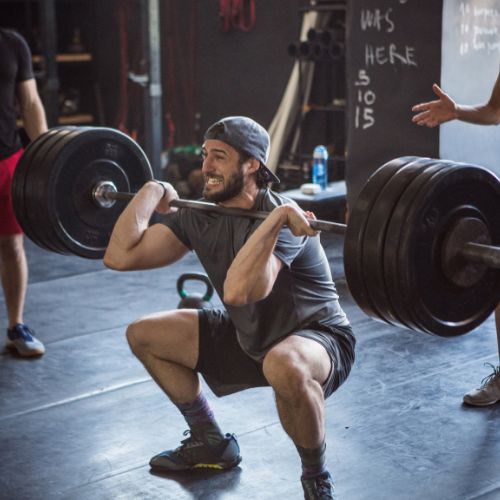
Your body will give you little hints that it may be in need of a deload. These signals can be subtle at first, but can become more obvious as they increase in intensity.
“listen to your body when it whispers, and you will not need to listen to it scream”
These signals can obviously be caused by OTHER reasons such as; lack of sleep, stress levels, poor quality nutritional intake, compromised immune system (slightly sick), digestive issues etc. However, for the sake of simplicity lets assume that all of these factors are accounted for and are remaining constant.
Having a sore body part or missing a few nights sleep may give you the impression that you need to do a de-load. It is important to remember this is not always the case.
I think there needs to be a clear reminder that some inexperienced people may perceive that they need a de-load but it could be due to other reasons:
Their technique may absolutely suck, leading to excess strain or injuries
They may be performing provocative exercises (such as exercises that go beyond the athletes limits in range of motion)
They do not know how to properly stretch / foam roll / recovery adequately
Their injury management skills are poor
They may have terrible mobility, tight hips or shoulders, making exercises they perform unsafe for them
They may be “smashing” themselves in the gym (always pushing to failure) instead of periodising the intensity of training
They may have tight muscles or knots which are mutilating their posture and overall energy levels
They may not be able to understand how the complexity of life events, stress and sleep and how these things can compromise recovery
All the factors listed above should be considered, because if a few of those factors are impacting the athlete, then there may not be a need for a deload.
Injury management, proper technique, mobility work and appropriate programming should not be confused with deloading
Without proper coaching, I would not trust a beginner or even intermediate athlete to know when to deload appropriately. Some may use a “deload” as an excuse to train less, instead of using it as a tool to come back stronger!
There are many reasons to deload, but the primary reason is NOT to take a break of training, rather it is to come back refreshed and STRONGER. When you take this week to let your body CATCH UP with your training demand, you may find your strength and vigour actually increases.
Joints, muscles and tendons have a chance to recover which is incredibly important for preventing injuries and long term training success (since most injuries are not muscular, but rather, tendon, ligament or joint related).
You may also find you can perform exercises with ease, to greater ranges of motion, due to central nervous system recovery and increases in mobility from loosening up tight muscles.
Okay, so you have decided you may want to perform a de-load week. During a de-load week you will want to make time for addition recovery tactics.
The procedure is relatively simple (in regard to training) but I like to add in additional recovery methods to boost the healing power of the system. Sitting down and waiting for your body to recover is not as effective as adding extra recovery methods into the mix. Your deloading can be enhanced by implementing some proven recovery methods.
Some additional recovery modalities: Massage, stretching / mobility work, ice baths, sauna, 8+ hours sleep, cupping, dry needling, epson salts, massage gun work, foam rolling, red light theraphy etc.
Also, here is a guide I wrote on Sleep Hacking: 4 steps to optimise your sleep
(it can vary depending on the circumstances)
Amount of total training sessions: Same
Total volume: Decrease by 25% – 4 sets becomes 3 sets
Weight lifted: Decrease by 20% – 100kg becomes 80kg
Reps performed: Decrease by 20% – 10 reps becomes 8 reps
General Rule: Don’t go beyond 3 reps from fatigue – this helps the nervous system
Overall Feeling: At the start of the week it will feel oddly easy and refreshing, at the end of the week you will be CRAVING the intensity of your previous training sessions
If you want to keep it simple – reduce everything by 20-30% and ethods (basics list below)
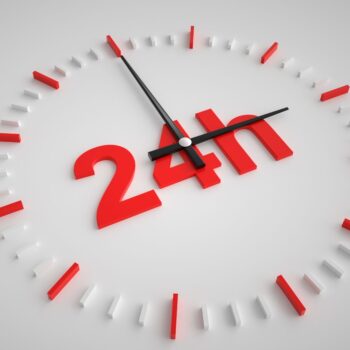
Not always, if you are smart about it you can implement the following:
Some athletes who train incredibly hard all year may benefit from taking a time period of “active rest” where they may spend 2-4 weeks of light or no training.
Most individuals would achieve this with their yearly holidays or time off during Christmas / new years.
This isnt exactly ‘nessesary’ as a tactic, as it has its pro’s and con’s.

The difference in changes in energy expenditure during the deload is trivial, however there is one circumstances that may be worth mentioning; If you are in a big calorie deficit (weight loss) you may want to move your calories to maintenance (NOT EXCESS) to aid the recovery.
If your nutrition is inconsistent and below average quality, none of this will matter. Optimal recovery, body composition changes and increases in strength all require you to be eating nourishing foods in the right amounts!
If getting your diet together is something you want to work on, check out the pages on personalised nutrition coaching. I can calculate your requirements (calories, macros etc) and even calculate your meals (you can choose them) to those requirements.
Most new athletes can get away with not de-loading for 3-6 months.
Once the ‘signals’ start appearing it may be a good idea to do your first deload and then get back to training for another 4-6 weeks and make an assessment if another is needed.
Deloads are more-so useful at the moderate / high level of training (4-6 moderate / intense sessions per week). Many beginners will find little benefit from this tactic but may wish to implement it simply for injury prevention and practicing smart training programming.

That my guide to deloading! I hope you have found it useful – comment below if you think i have missed anything and feel free to share it with friends and training buddies!
Stay frosty,
Simon

A good nights sleep contributes to your workout performance, awareness, mood, ability to handle stress, capability to learn new things, immune system, fat cell metabolism, hormone production, appetite hormone regulation and maintaining general wellbeing. If exercise was a pill, it would be the 2nd most powerful health booster, 2nd only to good sleep quality.
“A SUCCESSFUL DAY starts the NIGHT BEFORE”
I won’t go too in-depth into the benefits of sleep (in this post), but rather keep it short but sweet and talk about the 4 main steps to focus on to optimise your sleep.
Drum roll…
The first hour of the morning is the rudder of the day – Henry Ward Beecher
Sleep tracking may also be useful – I use an app called “sleep” has a range of features, but most notably the sensors can detect when you are moving (light sleep) and wake you up (with the alarm) during that light sleep window. This is useful because you wake up more refreshed instead of feeling sluggish.
I hope you found my sleep hacking guide useful, if you think i have missed anything of importance feel free to leave a comment below! Share it with friends if you found this useful!
Happy Zzzzz’s
Stay Frosty,
Simon
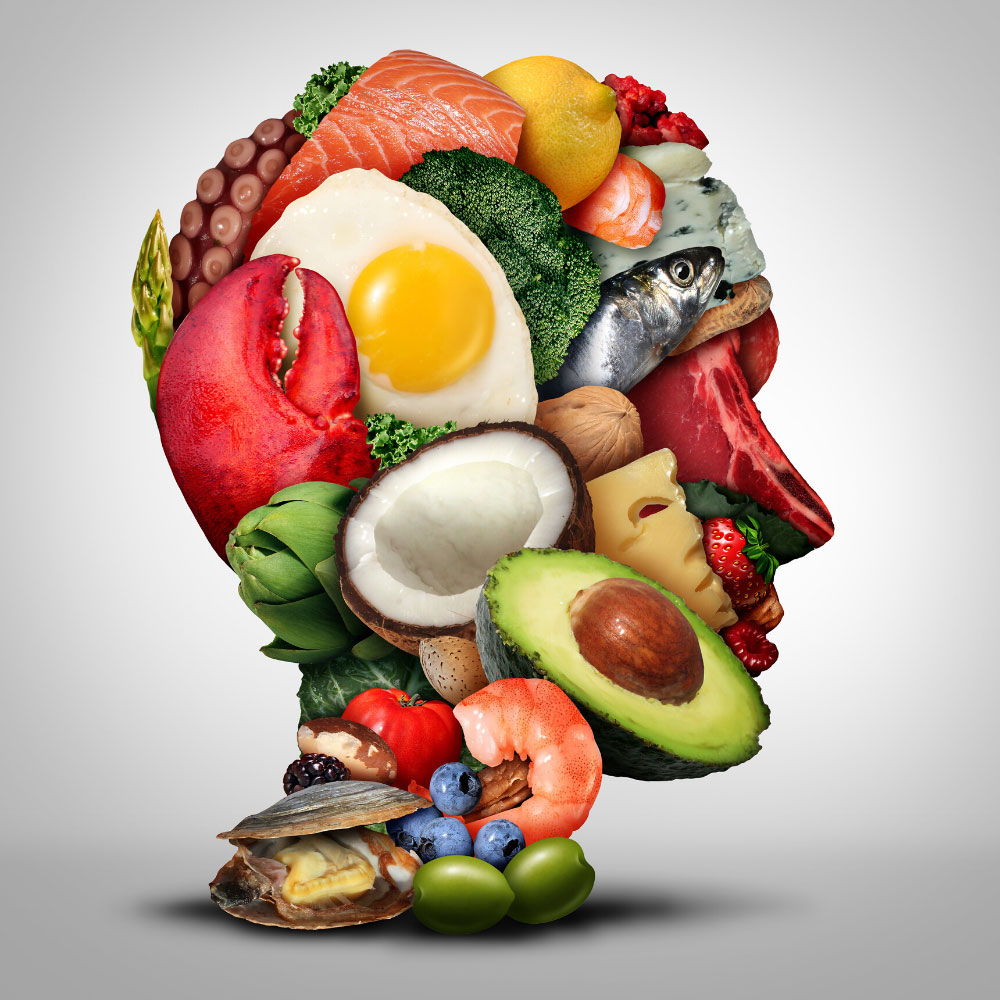
When we think of nutrition or dieting, we often think of weight loss and weight gain. This may be the strongest motivation for many to get involved in the subject, however, as you learn more about nutrition you realize that there is so much more to having an optimal diet than achieving the body shape you desire.
I love keeping my nutrition optimized so I can get the most out of my mind and body. I believe there is a big difference between the feeling/ energy/performance of a healthy brain which has been fed amazing nutrients for a sustained period of time compared to one that has not.
Try adding some of the following foods into your diet and you may also experience this difference
Bonus:
Here is an extra small list of HABBITS that are amazing for your brain health / development:
I hope you enjoyed this basic overview of the subject. I plan to touch more on this soon as I strongly believe a healthy life begins with a healthy mind.
Stay Frosty,
Trainer Simon
P.S. Recently I made this post about how your nutrition affects your energy levels. I touch on brain fog and some other mechanisms… here is the post:
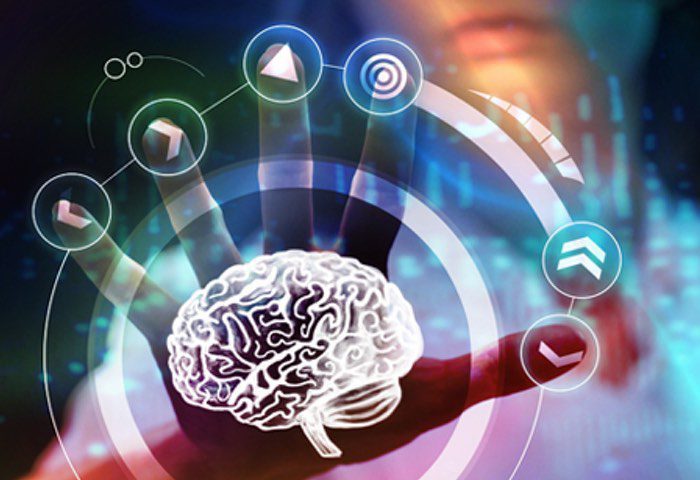
A client came in to see me today and revealed a revelation she had while implementing a nutrition plan I had written for her. Her body composition scan revealed some amazing changes. In just four-and-a-half short weeks, she had achieved 3.5 kg of fat loss and a significant increase in muscle mass. The real “reward” for my client however, was the fact her energy, focus, concentration, and willpower had all improved.
We began to discuss the fact that she was starting to notice some of the physiological changes you get from improving your nutrition and lifestyle. I explained to her that these changes happen to many people that undertake a dietary regime, especially those who make radical changes to their lifestyle and implement health boosting habits such as Intermittent Fasting. Ultimately these practices move their overall HEALTH from a low level to a higher level. Better yet, there is a level higher than “healthy”. After you make such changes, you can start striving for optimization.
Your physiology is a lot more adaptable than you think. Your nutrition and exercise and sleep are the basics. A solid foundation to build a house upon. Once built you can work on your “optimal” physiology, however, many people do not realize this exists because they have never experienced it. Bio-hacking helps you realize that there is endless room to improve. It opens many people up to exploring the different avenues of health and fitness available to them.
It sounds like some kind of futuristic Sci-Fi movie. The term has been floating around for the last couple decades but has recently been gaining more traction.
Do you exercise for energy or to improve your body composition? If you do, you are a biohacker. You are applying the stimulus of exercise to create a series of responses in your body – input (exercise) -> output (feel good, get energy, build muscle)
Do you have a wind-down routine and a regular sleep time? You are a biohacker. Input (wind down, sleep time) -> output (easier to fall asleep, wake up more refreshed)
Do you like to have a coffee to give you energy? You are a bio-hacker. Input (caffeine) -> output (energy / focus)
Bio-Hacking is really just fancy terminology for optimizing your nutrition and routines. If your body is a system, it has inputs(food, exercise, nutrients etc.) and outputs (energy, mood, concentration, body composition changes etc.).
Biohackers believe making constant tweaks to those inputs (like really fine-tuning them) can lead to immediate, measurable changes in the outputs. And they generally don’t wait around for a peer-reviewed meta-analysis of a new therapy or approach.
Dave Asprey, for example, is regularly quoted for improving his IQ by more than 30 points through enhancement of these systems.
We all learn routines from realizing something is producing the result we desired. Some of us may come home from a long day at work and want to relax, we may switch on the TV, others go for a run, others go to the gym, or some may play a computer game. This is a routine you have learned to get a response from your physiology. Input (Couch/TV) -> Output (Relax/Unwind)
The field of bio hacking expands on all types of routines to try and find “optimal” and it is a lot more broad that you may first imagine.
If we want better outputs—to have more energy and focus, to be free of disease, to have a better memory, to perform optimally in business and athletics—then let’s tweak the things we put into our body and mind to stack the deck in our favour. – Dave Asprey
You can even get your genetic code analysed (which only costs around $100). With that information, you can identify and prevent your genetic faults such as the increased risk of diseases. Your DNA information can also be used to optimize your body composition results by doing an analysis of the way your body responds to nutrients and training. For example, some people may have genetically slower tendon repair, therefore, to prevent injuries they would need to extend their warmup times and supplement nutrients such as collagen, gelatin, vitamin C and increased anti-inflammatory foods. Many professional athletes are beginning to use such methods to get ahead of their competitors.
You can do this one through www.23andme.com and then running your DNA text document through a range of online screening tools (I will list some links below). Some people wouldn’t want to know what could potentially end their life. Ignorance is bliss, but in my mind, the stress of applying a few lifestyle changes now will prevent a lot of stress later down the track. Prevention is the best cure.
If you’re someone who loves data and have an independent streak when it comes to taking charge of your health, incorporating elements of biohacking into your healthy lifestyle can totally work. I’m all about trying new things, and if something doesn’t have negative effects, why not try it and see how you feel?
Try a new diet plan, try an intermittent fasting routine, try a series of brain-boosting supplements, get a prescription for modafinol, start taking cold showers, or even learn what your DNA has in store for you.
You may think your mental or physical performance is good or optimal… but you may not know there is a level above the one you are currently on, because you have no reference point other than what you know.
“If you fight for your limitations you get to keep them” – Jim Kwik
As with my client who tried the new diet, quit sugar and alcohol for a month, many often make a note on their mental clarity and energy level improvements. They are achieving a higher level of health, vitality and even brain-boosting ‘superpowers’ that they previously didn’t know existed.
With biohacking, you may just find a level above the one you are currently on. You can go deep down the rabbit hole with this, and in my mind, if it is for the purpose of personal development, improving your quality of life or preventing diseases, then full steam ahead!
Stay frosty,
Trainer Simon
You can read more about bio-hacking at: https://blog.bulletproof.com/beginners-guide-to-biohacking-101/
Brain & Memory Hacking: Jim Qwik – https://www.youtube.com/watch?v=iAo0pYOmnKE
Bulletproof Podcast: https://blog.bulletproof.com/category/podcasts/
Ben Greenfield Podcast: https://bengreenfieldfitness.com/podcast/
Introduction to nootropics: https://www.reddit.com/r/Nootropics/wiki/beginners
Self-hacked: https://www.selfhacked.com/start-here/
Get genetic testing: www.23andme.com
Put your DNA through this software to find out genetic flaws: https://www.foundmyfitness.com/genetics
List of sites to input your DNA information: https://www.xcode.life/23andme-raw-data/23andme-raw-data-analysis-interpretation/
Dr Amun Ra Longevity Diet Protocol (very deep down the rabbit hole): https://www.youtube.com/watch?v=dR1FCJS8DoM
Fuel your potential with healthy nutrition. Found My Physique’s goal is to help make amazing body transformations easy, using proven nutrition and training protocols.

